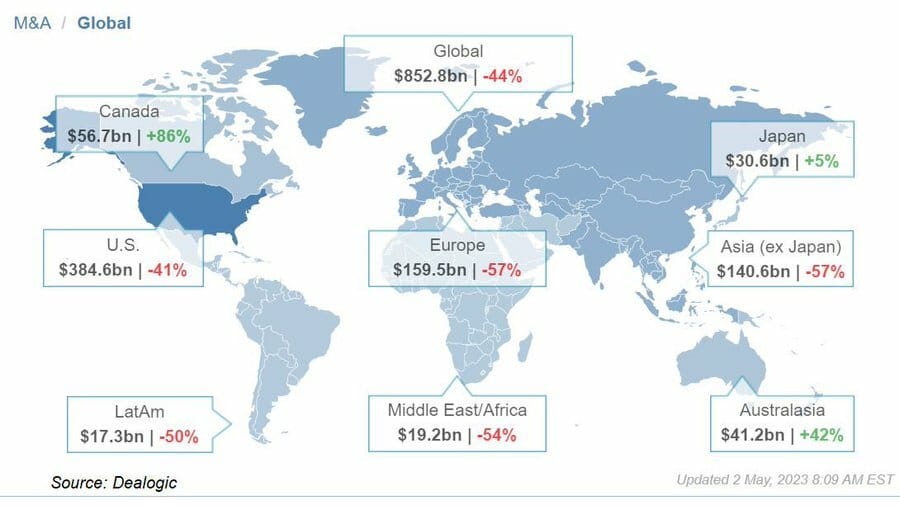Morning Market Download from Invincible Money
Personal finance + economics + markets
Finance in 5 minute a day to help you make better money decisions.
Economy
Treasury Sec. Yellen said the U.S. is in danger of running out of cash as soon as June 1 if the debt ceiling isn’t raised. McCarthy, Biden and other leaders will meet May 9th to talk about the debt ceiling. Economists (and Yellen) are warning that if an agreement isn’t reached, financial markets will be…unhappy.
Eurozone inflation rose to 7% for April, exceeding expectations.
Layoffs du jour: Morgan Stanley cutting 3,000 jobs globally due to recession fears. The CEO said he doesn’t expect the economy to rebound before the second half of this year or early next year.
GM cut 500 jobs in March after also announcing 5,000 employees were giving voluntary buyouts.
IPO volume is down 41% in the US so far this year so it makes sense investment banks are cutting.

AI is already affecting jobs. Dropbox announced they’re laying off 500 people and IBM is now pausing hiring for 7,800 roles that could be done by AI and said AI would affect most jobs within 5 years. This is going to be a common story going forward (see Chegg below).
A study by none of than OpenAI (owners of ChatGPT) found that 80% of workers will be affected by AI.
The ISM Manufacturing index rose slightly to 47.1 from 46.3, indicating the economy is shrinking slower. A score under 50 means shrinking and over 50 means expansion of the economy.
News
The FDIC is finally talking about deposit insurance reform. Currently, every deposit is guaranteed up to $250,000. With the collapse of Silicon Valley Bank and others, it was apparent that wasn’t enough. They’re considering increasing the amount for everyone or just giving business accounts much more coverage.
Carl Icahn is the latest target of Hindenburg Research for possible fraudulent claims about his hedge fund $IEP, which advertises a 19% dividend yield. However, 85% of that is paid to Icahn and his sons. The stock was down 16% yesterday.
Yesterday JPMorgan bought (rescued) First Republic Bank and now has more than $2.4 Trillion in deposits.
Stocks
Stocks started the day down about 1.5% yesterday, but recovered mostly, on renewed fears the banking crisis isn’t over.
Pres. Biden declared the banking system “safe and sound,” so nothing to see here.
PacWest Bancorp may be the next regional bank to fail as deposits were down 20% during Q1 and the stock is down 62% the past 6 months.
Deere is expanding it’s cloud-based operations for remote farmers to get access to satellites. The company is focusing on their high-end automation products, like the driverless tractor.
Chegg stock down 48% yesterday after saying ChatGPT is killing its business. They said the selloff was an overreaction to their comment. Chegg provides online tutoring and homework assistance and say more students are turning to ChatGPT.

Crypto
Coinbase fights back by filling a complaint against the SEC asking for formal crypto regulatory guidance. Gensler, of course, disagrees.

Cathie Woods’s ARK Invest fund bought $8.4 million in Coinbase shares yesterday to add to her position.
MicroStrategy had its first profitable quarter in 9 thanks to the recent Bitcoin surge.
Personal Finance
Spend less than you earn. Invest the difference. Are you doing that simple, yet effective strategy? If you don’t know, it’s time to start budgeting and tracking your money every week so you know what percent of your income is going into your investments.
Be a Better Investor
“There is no finer investment in a community than putting milk into babies.”
Get Smarter
People misunderstand what Open Interest is in investing and I see it all the time in forums. So here’s what it really is:
Open interest is the total number of outstanding futures or options contracts that have not been settled by an offsetting trade or an expiration. It's used by investors and traders to measure market liquidity and activity, with high open interest indicating significant participation and low open interest indicating less liquidity.
Unlike trading volume, which represents the total number of contracts traded during a specific period, open interest represents the total number of contracts that are still open and not yet settled. Investors use open interest to gauge market sentiment and identify potential price trends, with an increase in open interest along with an increase in price suggesting a bullish trend, and a decrease in open interest along with a decrease in price suggesting a bearish trend.
Legal Stuff
Nothing in this newsletter is financial advice. Always do your own research and think for yourself.